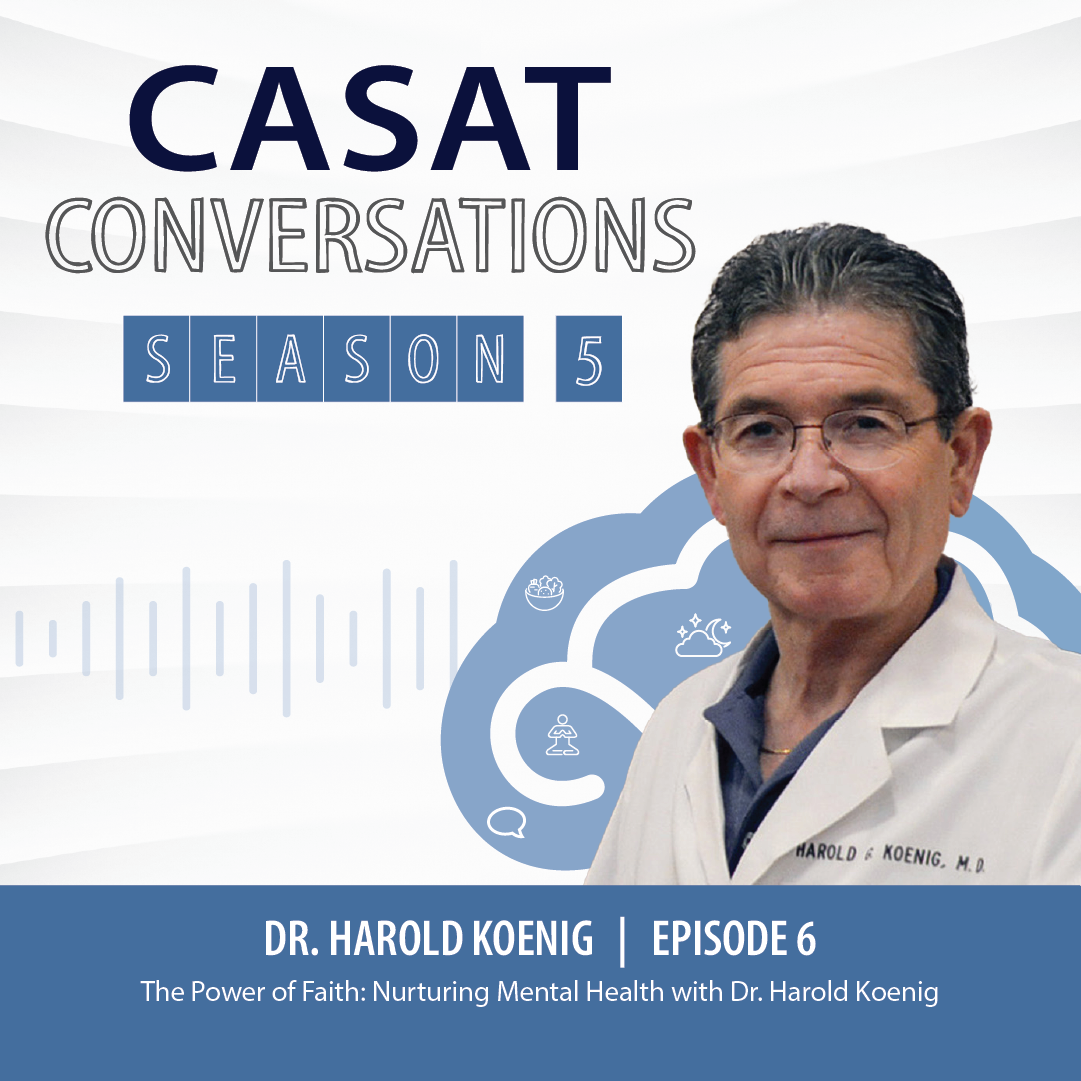In the Light and Shadows: A Holistic View of Spirituality and Mental Health
An inherent aspect of the human experience involves seeking meaning, purpose, and connection to something greater than oneself. Religion and spirituality often serve as avenues through which people find answers to these deep questions. In recent decades, researchers have sought to understand religion and spirituality’s impact on physical and mental health. While some individuals derive comfort and support from their religious beliefs, others may grapple with challenges or conflicts contributing to mental health issues. Today, we’ll explore both. As the acknowledgment of spirituality’s influence on physical and mental health grows, it’s essential for healthcare providers to incorporate spiritual histories in assessments.
What is spirituality?
Spirituality is a broad concept that encompasses a variety of beliefs, practices, experiences, and perspectives. While the definition of spirituality can vary among different individuals and cultures, it often involves a search for meaning, purpose, and a connection to something greater than oneself. Here are some key aspects commonly associated with spirituality:

Connection to the Sacred or Transcendent: Many spiritual traditions involve a belief in a higher power, divine force, or ultimate reality. This may be referred to as God, the Divine, the Universe, or by other names depending on the religious or philosophical context.

Personal Growth and Transformation: Spirituality often involves a journey of self-discovery, personal development, and transformation. It may include practices aimed at expanding consciousness, cultivating virtues, and fostering inner peace.

Presence and Awareness: Spiritual practices often emphasize being present in the moment and cultivating awareness. This may involve meditation, prayer, or other contemplative practices that help individuals become more aware of their thoughts, feelings, and surroundings.

Ethical and Moral Values: Many spiritual traditions provide a framework for ethical and moral behavior. This may include principles and guidelines for leading a virtuous and compassionate life.

Community and Connection: Spirituality is not always a solitary pursuit; it can involve a sense of community and shared beliefs. Religious institutions, spiritual groups, or like-minded communities provide a supportive environment for individuals on a spiritual path.

Seeking Meaning and Purpose: Spiritual seekers often explore fundamental questions about the meaning of life, the nature of existence, and their purpose in the world. This search for meaning can lead individuals to explore various religious, philosophical, or mystical traditions.

Symbolism and Rituals: Many spiritual traditions use symbols, rituals, and ceremonies to convey and celebrate important aspects of their beliefs. These can range from sacred texts and symbols to specific practices performed during worship or meditation.
It’s important to note that spirituality can take on different forms and expressions. People may identify with a particular religious tradition, follow a specific spiritual philosophy, or consider themselves spiritual without adhering to any organized belief system. Additionally, spirituality is a highly personal and subjective experience, and individuals may find their own unique paths and expressions of spiritual connection.
What is the difference between religion and spirituality?
Religion and spirituality are related concepts, but they have distinct characteristics and often serve different roles in the lives of individuals. Here are some key differences between religion and spirituality:
Organized vs. Personal and Individualistic:
| Religion: | Spirituality: |
|---|---|
| Typically, religion is associated with organized, institutionalized belief systems. It often involves a set of doctrines, rituals, and practices shared by a community of believers. Religions often have established institutions, clergy, and specific places of worship. | Spirituality, on the other hand, is often more personal and individualistic. It may or may not be connected to organized religious traditions. Spirituality is about the individual’s search for meaning, connection to the divine, and personal growth. |
Beliefs and Doctrine vs Personal Exploration:
| Religion: | Spirituality: |
|---|---|
| Religions usually have a set of specific beliefs and doctrines that followers are expected to adhere to. These beliefs often form the core tenets of the faith and are outlined in sacred texts or scriptures. | Spirituality is often less concerned with adherence to specific doctrines. It allows for a more fluid and personal exploration of beliefs. Spiritual individuals may draw inspiration from a variety of sources and may not follow a prescribed set of dogmas. |
Community vs. Individualism:
| Religion: | Spirituality: |
|---|---|
| Religion often involves a sense of community and shared identity. Religious communities gather for worship, rituals, and communal activities. Membership in a religious community can provide a sense of belonging and support. | While spirituality can be a shared experience within a community, it is often a more individualistic pursuit. Spiritual individuals may seek their own unique paths and practices, and their spiritual journey may not be tied to a specific community. |
Standardized Rituals and Practices vs. Inner Journey:
| Religion: | Spirituality: |
|---|---|
| Religious traditions typically involve a set of rituals, ceremonies, and practices that are standardized and often performed collectively. These rituals can include prayers, sacraments, and other prescribed observances. | Spiritual practices can vary widely and may include meditation, prayer, contemplation, or other activities aimed at fostering personal growth and connection to the divine. The emphasis is often on the individual’s experience and inner journey. |
Hierarchy and Authority vs. Inner Wisdom:
| Religion: | Spirituality: |
|---|---|
| Religions often have established hierarchies, clergy, and religious authorities who interpret and guide the faith. These figures may hold specific roles and responsibilities within the religious community. | Spirituality tends to be more egalitarian, with individuals taking a more direct and personal approach to their connection with the divine. While spiritual teachers or guides may exist, their authority is often less formalized than religious leaders. |
It’s important to note that these distinctions are generalizations, and there can be significant variations within both religious and spiritual practices. Some individuals may find that their spirituality is deeply rooted in a specific religious tradition, while others may identify as spiritual but not religious. The relationship between religion and spirituality is complex and can manifest in diverse ways across cultures and individuals.
What are the mental benefits associated with spirituality?
Spirituality has been associated with various mental health benefits, and for many individuals, it serves as a source of comfort, resilience, and purpose. It’s important to note that the impact of spirituality on mental health can vary among individuals, and the benefits may not be universal. Here are some potential mental health benefits associated with spirituality:

Sense of Meaning and Purpose: Spirituality often provides individuals with a sense of meaning and purpose in life. Believing in a higher power or connecting with a broader spiritual framework can give life a deeper significance, which can contribute to overall well-being.

Coping with Stress and Adversity: Spiritual beliefs and practices can serve as coping mechanisms during times of stress, grief, or adversity. Many people turn to prayer, meditation, or other spiritual practices to find solace and strength in challenging situations.

Emotional Resilience: Spirituality may contribute to emotional resilience, helping individuals bounce back from setbacks and navigate difficult emotions. Spiritual practices often emphasize mindfulness, gratitude, and compassion, which can positively impact emotional well-being.

Connection and Community Support: Participation in religious or spiritual communities can provide a sense of belonging and social support. Being part of a community that shares common beliefs and values can foster connections, reducing feelings of isolation and loneliness.

Enhanced Mental Health Coping Strategies: Spiritual practices often involve activities that promote mental well-being, such as meditation, mindfulness, and contemplation. These practices can enhance coping skills, reduce anxiety, and contribute to better mental health.

Alleviation of Anxiety and Depression: Some research suggests that spirituality may be associated with a lower risk of anxiety and depression. Spiritual beliefs and practices may provide a sense of hope, comfort, and optimism, contributing to mental health.

Improved Self-Esteem and Self-Concept: Spirituality can contribute to a positive self-image and improved self-esteem. Believing in one’s intrinsic value and connection to a higher power can foster a sense of worth and purpose.

Encouragement of Positive Lifestyle Choices: Many spiritual traditions advocate for healthy lifestyle choices, such as moderation in behavior, compassion for oneself and others, and a focus on holistic well-being. These principles can contribute to overall mental and physical health.

Mind-Body Connection: Spiritual practices often involve attention to the mind-body connection. Practices like meditation and mindfulness can have positive effects on both mental and physical health, promoting relaxation and reducing the impact of stress.

Fostering Gratitude and Positivity: Spiritual perspectives often encourage gratitude and a focus on positive aspects of life. Gratitude practices, common in many spiritual traditions, have been linked to improved mental health outcomes.
It’s essential to recognize that individuals vary in their spiritual beliefs, and what works for one person may not work for another. Moreover, mental health is a complex and multifaceted aspect of well-being, and spiritual practices should not be seen as a substitute for professional mental health care when needed. It’s always advisable to seek the guidance of mental health professionals for comprehensive support and treatment.
What are some of the drawbacks or challenges associated with religion?
While religion can offer numerous mental health benefits, it’s important to acknowledge that there can also be drawbacks or challenges associated with religious beliefs and practices. Here are some potential drawbacks:

Guilt and Fear: Some religious teachings may emphasize sin, guilt, and the fear of divine punishment. This can lead to heightened anxiety, self-judgment, and feelings of inadequacy among individuals who struggle to meet perceived moral standards.

Dogma and Rigidity: Rigidity in religious dogma or strict interpretation of doctrines may contribute to closed-mindedness and intolerance. This can negatively impact mental health by fostering judgmental attitudes and limiting acceptance of diverse perspectives.

Crisis of Faith: Individuals may experience periods of doubt or crisis of faith, which can lead to internal conflict, anxiety, or feelings of spiritual emptiness. The struggle to reconcile personal beliefs with external expectations can be challenging.

Religious Conflict: Religious differences and conflicts, both on a personal and societal level, can contribute to stress, social tension, and even violence. The pressure to conform to specific religious norms may result in discrimination and exclusion.

Negative Impact on Mental Health Treatment: In some cases, religious beliefs may discourage individuals from seeking mental health treatment. This can be due to stigmas associated with mental health issues or a belief that prayer alone can address psychological challenges.

Suppression of Critical Thinking: Some religious traditions may discourage critical questioning or skepticism. This can hinder intellectual and emotional growth, as individuals may avoid exploring ideas or perspectives that challenge their existing beliefs.

Identity Conflicts: While religious identity can provide a sense of belonging, it may also contribute to identity conflicts, especially in diverse or multicultural societies. Individuals may feel pressured to conform to religious norms that conflict with their personal values or cultural identity.

Fear of Divine Judgment: A fear of divine judgment or eternal consequences for one’s actions can contribute to obsessive guilt, anxiety, and a sense of unworthiness. This fear may be particularly pronounced in religious traditions with a strong emphasis on judgment and punishment.

Gender and Sexual Identity Issues: Some religious teachings may stigmatize or condemn certain sexual orientations or gender identities. Individuals who identify as LGBTQ+ may experience psychological distress due to the perceived conflict between their identity and religious teachings.

Cultural and Societal Pressures: Cultural and societal expectations associated with religious beliefs may create pressure to conform to specific roles or behaviors. This pressure can lead to internal conflict and mental health challenges for those who do not align with these expectations.
It’s crucial to recognize that the impact of religion on mental health is highly individualized, and experiences vary widely. For some, religious beliefs and practices provide a source of comfort, meaning, and support. For others, challenges or conflicts associated with religious beliefs can contribute to mental health issues. Open communication, tolerance, and a nuanced understanding of individual experiences are important when considering the relationship between religion and mental health. Additionally, seeking professional mental health support can be valuable for individuals navigating complex emotional and psychological challenges.
Given the substantial evidence supporting the influence of spirituality and religion on mental health, there is an increasing demand for healthcare providers to include spiritual histories in their assessments. Survey findings indicate that 45% of physicians and 56% of nurses believe that healthcare providers should conduct spiritual screenings. Interestingly, opinions on the appropriateness of spiritual screenings varied depending on the nature of the patient’s visit. Participants expressed that a spiritual screening is suitable for all outpatients (46-57%), well-visit exams (50-60%), the chronically ill (71-75%), and the terminally ill (79-82%).
To enhance healthcare providers’ ability to identify and address patients’ spiritual values, beliefs, and practices there is a need for education, training, and support. It’s noteworthy that a significant proportion of healthcare professionals within the AHS (although not currently implementing spiritual screenings widely) acknowledge the importance of conducting spiritual screenings. Many express a willingness to perform spiritual screenings and review the results. Therefore, investing in education, training, and support could bridge the gap between recognition of the significance of spiritual aspects in healthcare and actual implementation.
Ready to Learn More:

Listen to Season 5 of CASAT Conversations. In episode 6, Dr. Harold Koenig shares his decades of research on religion’s mental health benefits. You’ll also hear about the significance of faith and its impact on mental well-being, and we delve into the key implications to consider when embracing the importance of religion and spirituality in public health. He also highlights the importance of a patient-centered approach when integrating religion, spirituality, and mindfulness-based practices. Listen today to expand your understanding of the profound connections between spirituality, religion, mental health, and holistic care.
References
Koenig, H.G. (2010), Spirituality and mental health. Int. J. Appl. Psychoanal. Studies, 7: 116-122. https://doi.org/10.1002/aps.239
Koenig, H. G., Perno, K., & Hamilton, T. (2017). The spiritual history in outpatient practice: attitudes and practices of health professionals in the Adventist Health System. BMC medical education, 17(1), 102. https://doi.org/10.1186/s12909-017-0938-8
Rosmarin, D.H., Pargament, K., & Koenig, H.G. (2020), Spirituality and mental health:challenges and opportunities. The Lanset, 8(2) 92-93. https://doi.org/10.1016/S2215-0366(20)30048-1
Verghese A. (2008). Spirituality and mental health. Indian journal of psychiatry, 50(4), 233–237. https://doi.org/10.4103/0019-5545.44742
Blog Post Tags:
Related Blog Posts
Related Learning Labs
Related Resources
.
- Buscar Tratamiento de Calidad para Trastornos de uso de Sustancia (Finding Quality Treatment for Substance Use Disorders Spanish Version)
- Finding Quality Treatment for Substance Use Disorders
- Focus On Prevention: Strategies and Programs to Prevent Substance Use
- Monthly Variation in Substance Use Initiation Among Full-Time College Students
- The National Survey on Drug Use and Health (NSDUH) Report: Monthly Variation in Substance Use Initiation Among Adolescents









It would be nice to see a more balanced article on talking about the positives and negatives of both religion and spirituality. I agree with all the critiques of religion that the article mentions and yet there is no discussion on possible negatives of spirituality.
Thank you for your feedback. We appreciate you taking the time to read this blog post, and we will be adding a section on the possible negatives of spirituality to ensure a more balanced article.